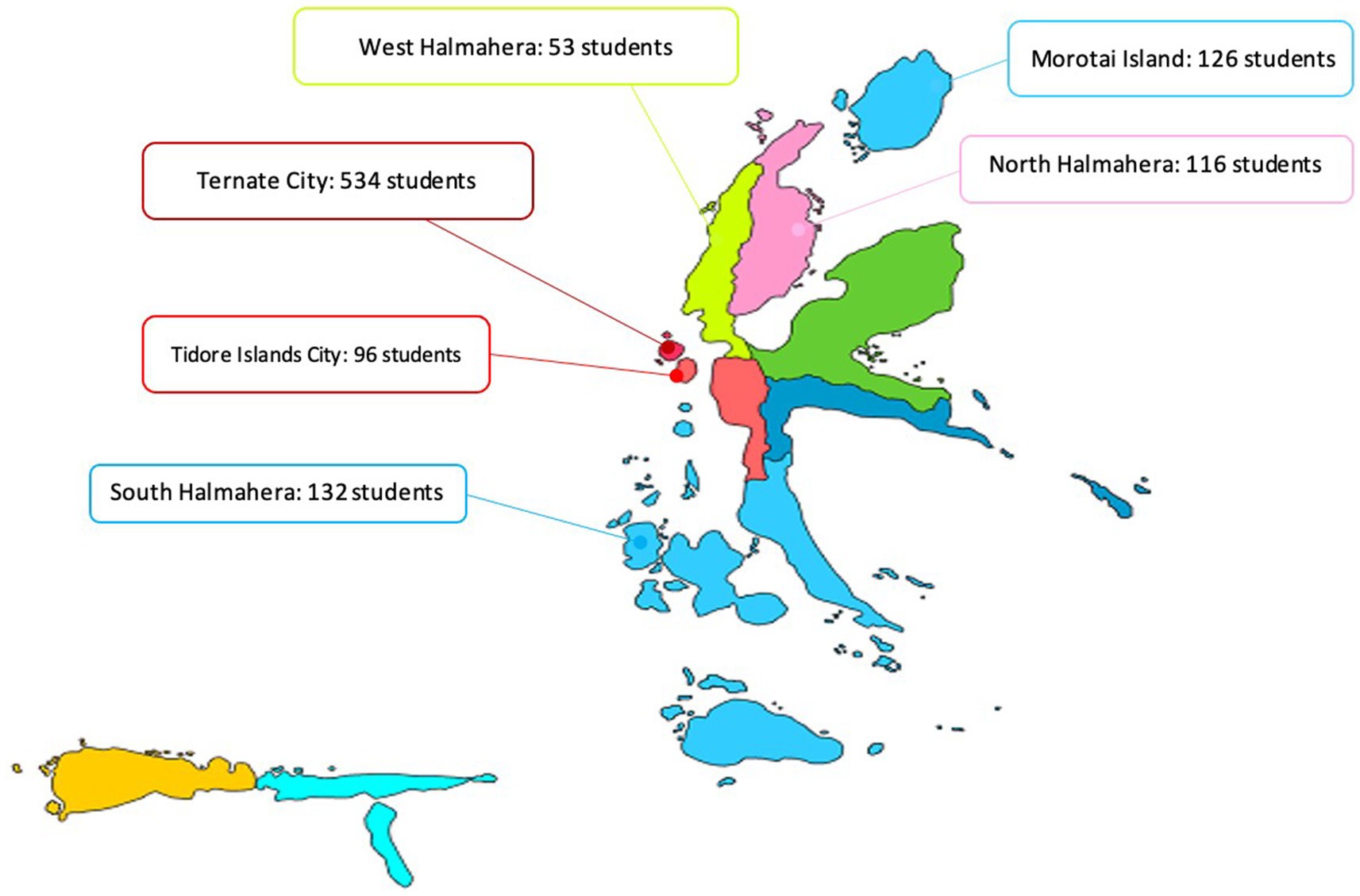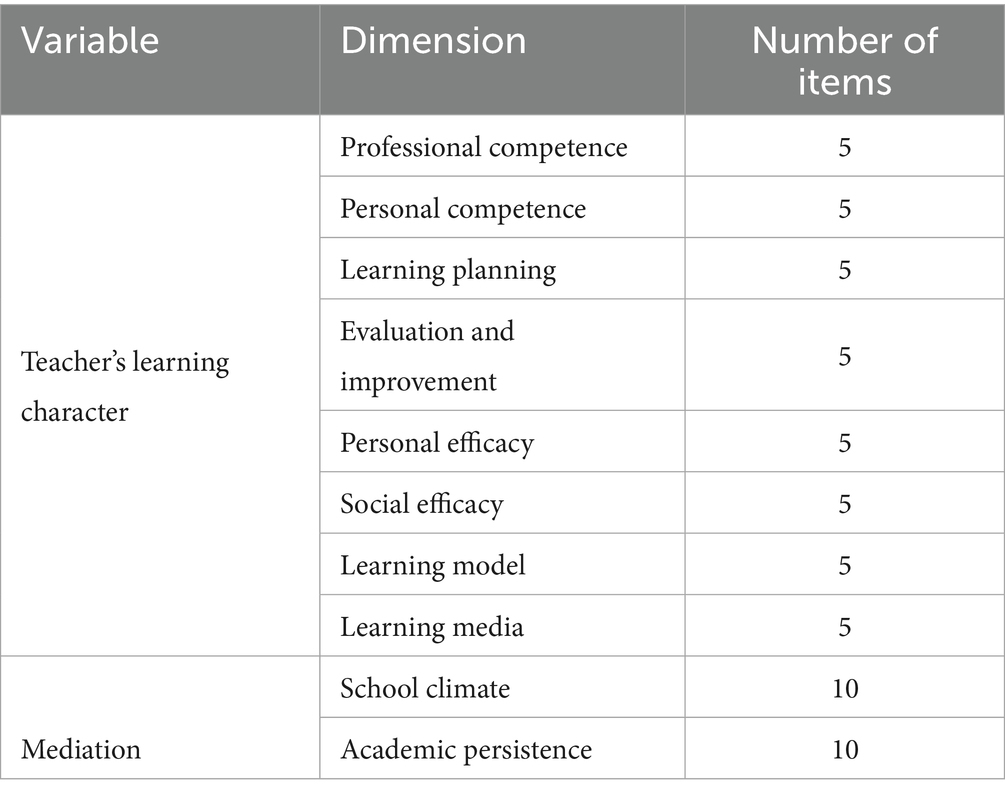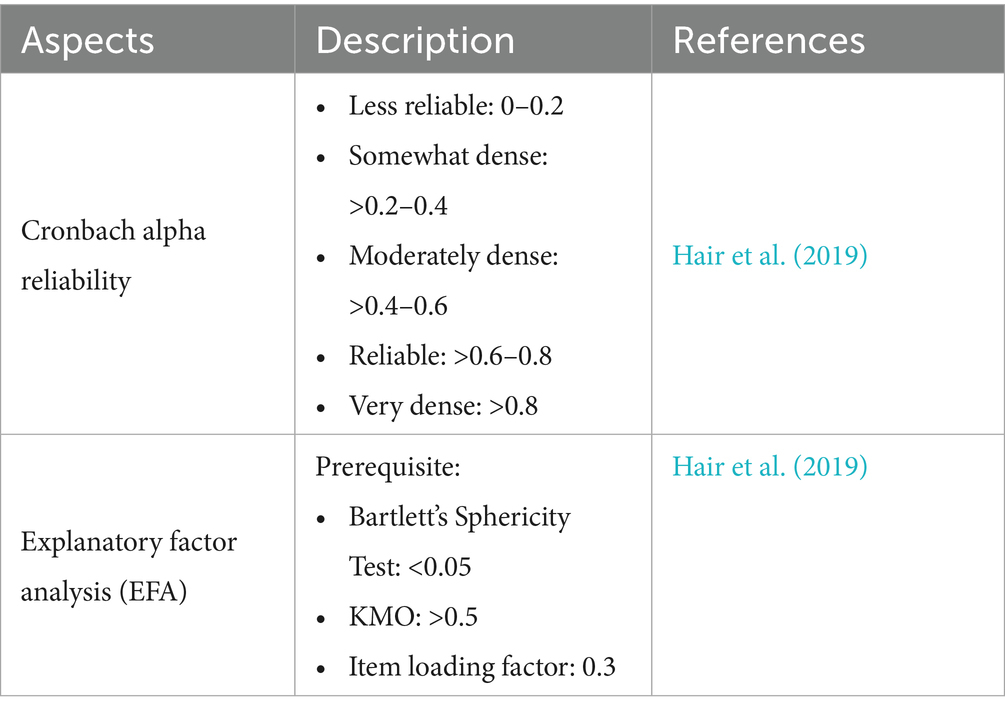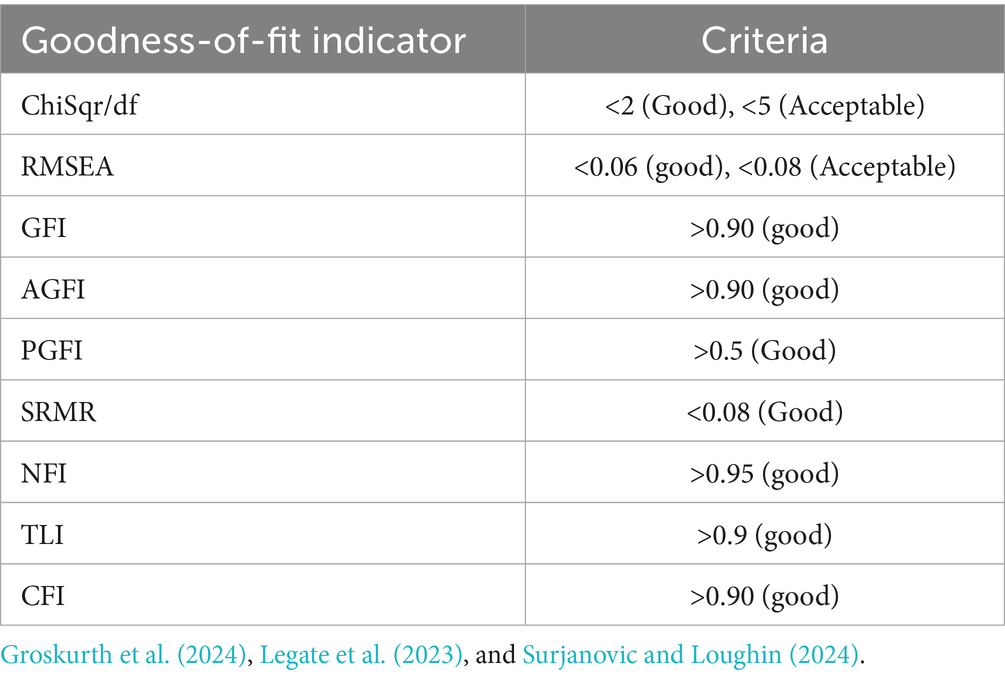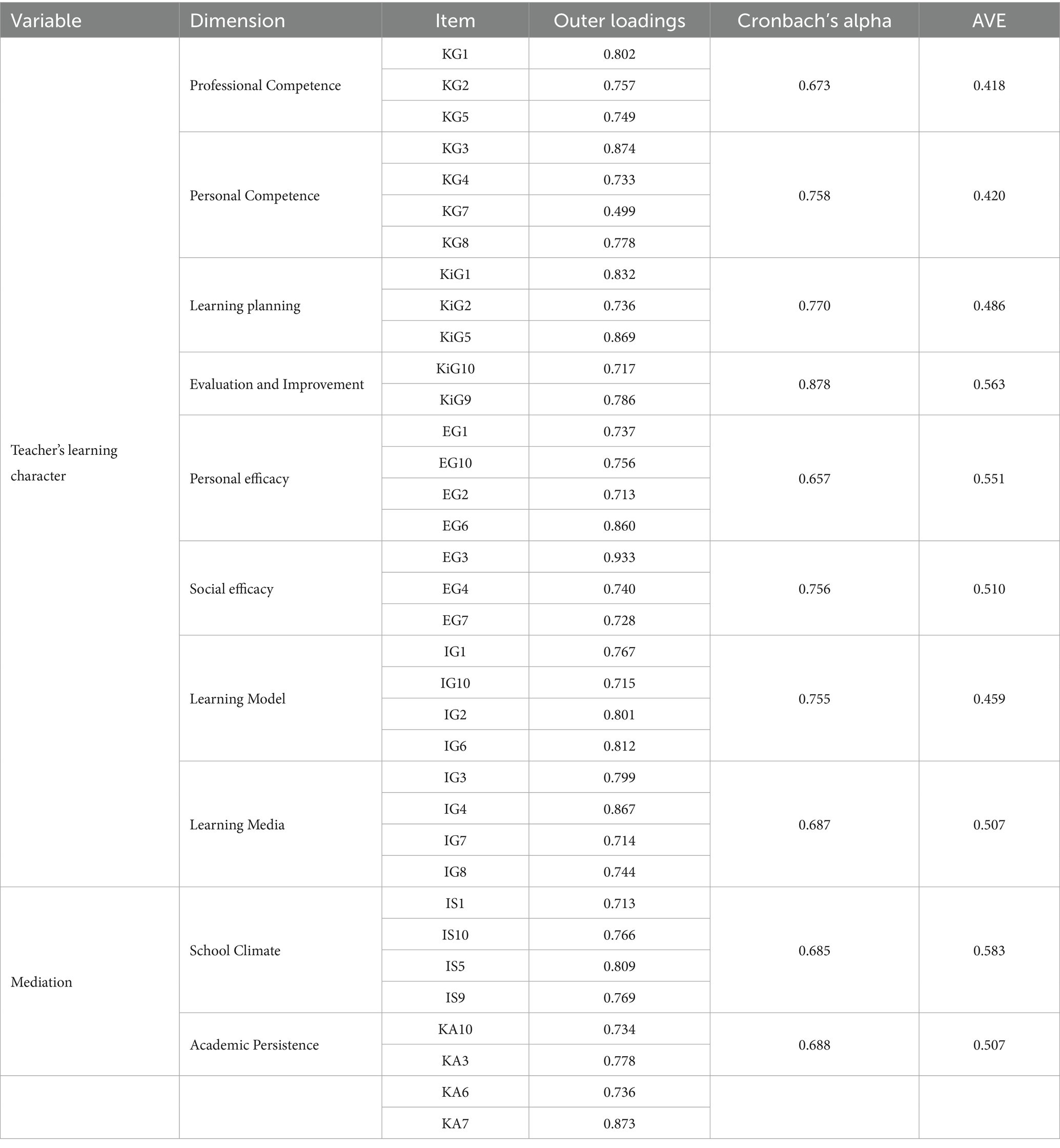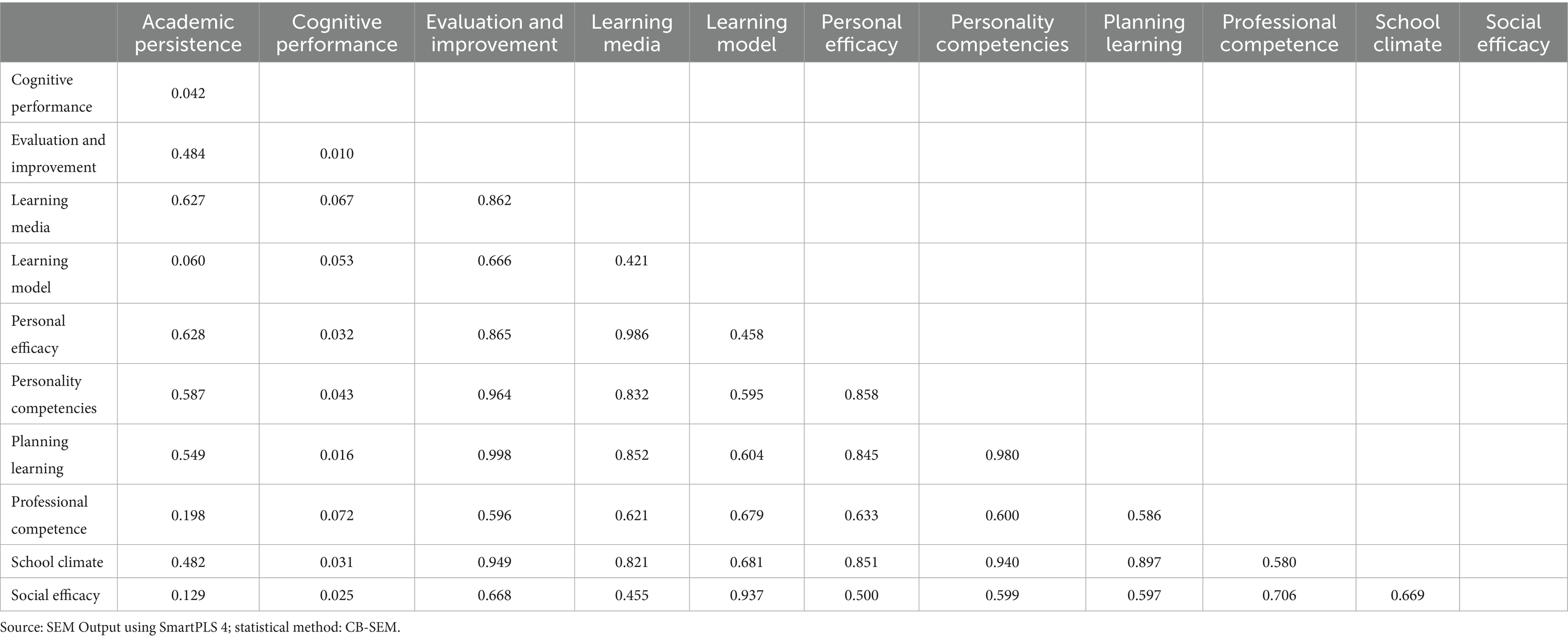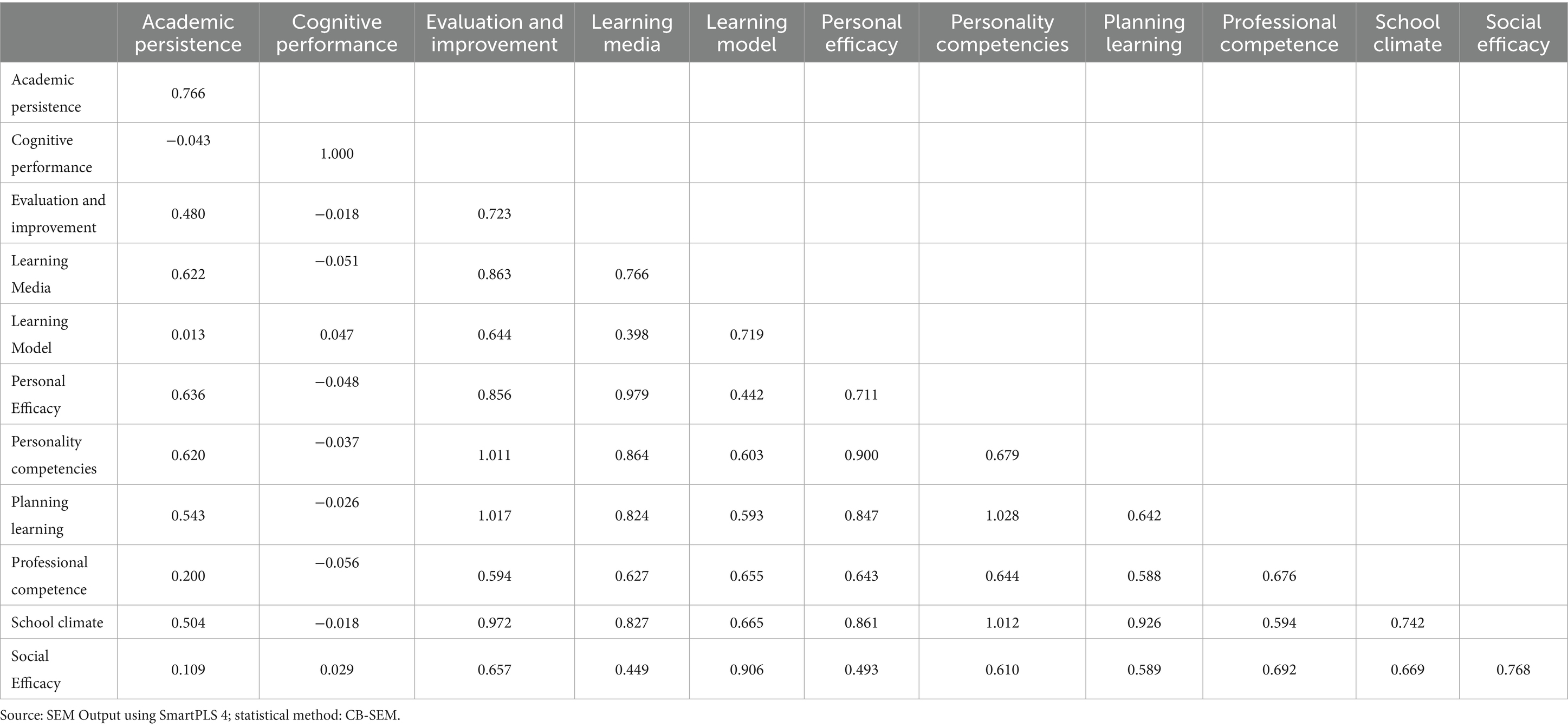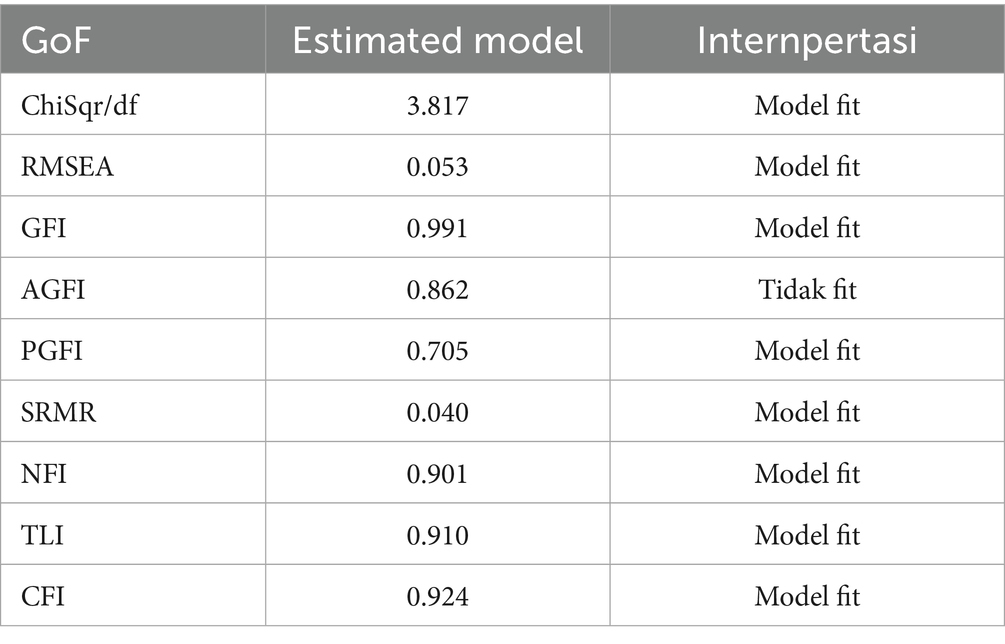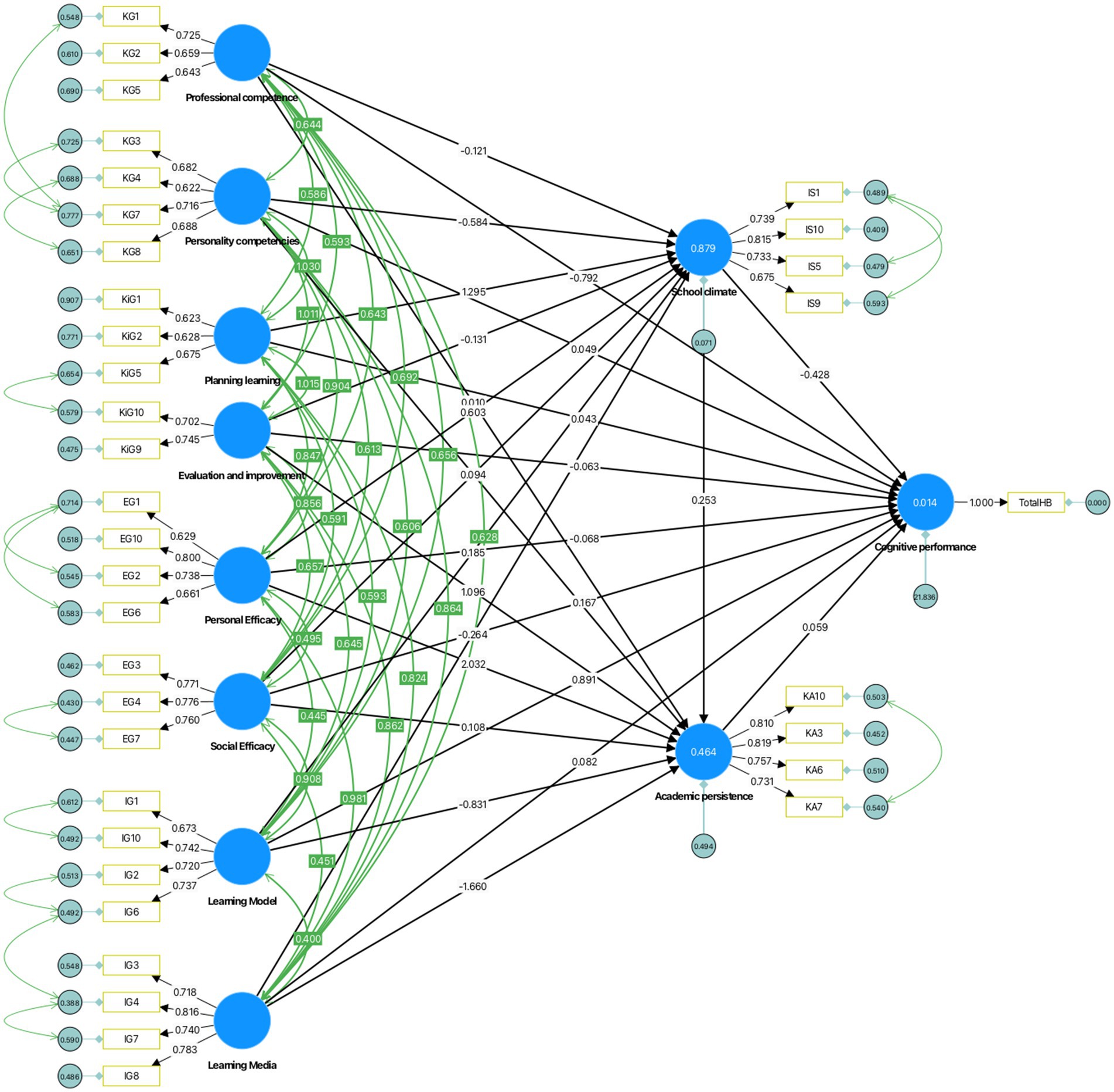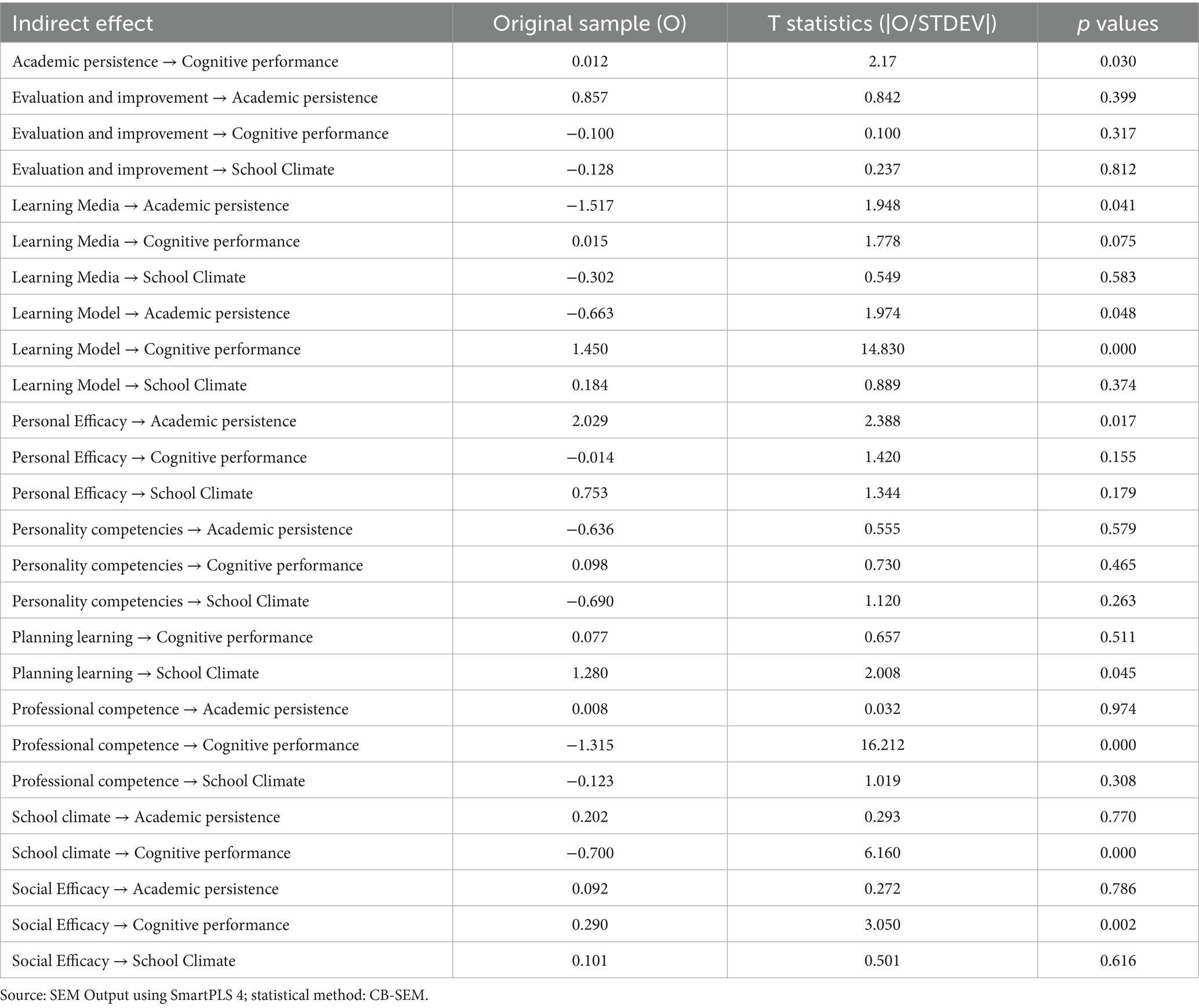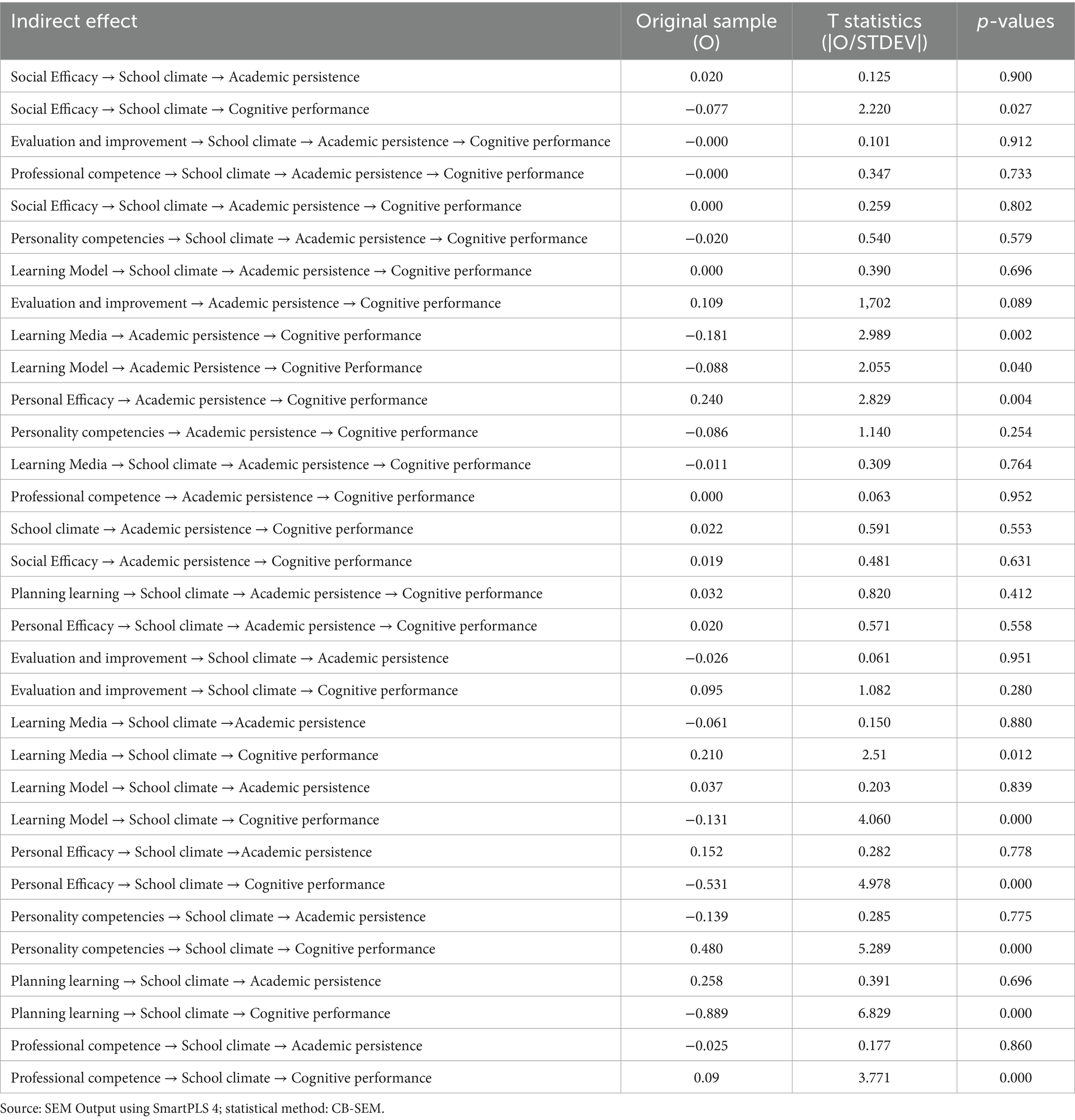- Department of Chemistry Education, Faculty of Mathematics and Natural Science, Yogyakarta State University, Yogyakarta, Indonesia
Cognitive achievement in education results from the complex interaction between personal, institutional, and contextual factors. This study investigates how teacher learning characteristics such as instructional competence, personal efficacy, and pedagogical strategies along with school climate and students’ academic persistence, influence cognitive outcomes. The purpose of this study is to analyze the influence of teachers’ learning characters on cognitive achievement by considering the mediating role of school climate and students’ academic perseverance. This study uses a quantitative approach with a covariance-based structural equation modeling method (CB-SEM). The research sample consisted of 1,057 high school students in North Maluku Province, Indonesia. Data were collected using a Likert scale questionnaire and analyzed using SPSS 24, JASP 0.19, and SmartPLS 4. The results showed that professional competence, personal efficacy, and instructional models employed by teachers significantly affected cognitive achievement. In addition, the school climate and academic perseverance are mediators that strengthen the relationship between teachers’ learning character and students’ cognitive achievement. These findings confirm that a practical learning approach supported by a conducive school environment and students’ academic perseverance can contribute to the quality of education as it improves learning outcomes. This research provides insight into educators and education policymakers to develop effective learning strategies.
Introduction
In this modern era, education development is the key to forming modern human beings who can master various sectors of life. Education encourages the development of universal human values individually and collectively, improves public life, and encourages active participation in a democratic society (Sarkar, 2023; Spiel et al., 2018). Implementing good education will produce graduates who are ready to compete and qualified (Sunarya et al., 2024). To form graduates who compete in the world of work, various innovations are needed in holistic learning and to create a competitive character for students (Abuelmaatti and Vinokur, 2024; Kocsis and Pusztai, 2025). There are various variables in determining the quality of education, one of which is the achievement of cognitive achievement (Purković and Kovačević, 2020). Achievement of Cognitive Achievement in Education is influenced by the complex interaction between contextual factors, personal and institutional. In other words, the complexity of school management, teachers’ learning character, and students’ personal (Choi and Lee, 2022; Ma et al., 2017). The output of the quality of education that is aspired to will encourage economic growth, reduce inequality, and improve the quality of life of the community, the country, and the nation (Zickafoose et al., 2024).
Although there are many innovations in the character of teacher learning, the formation of a school climate has improved the quality of education by adopting various variables in producing quality learning outcomes. Still, in reality, it is a challenge (Ni and Wang, 2022). Encouraging teachers to be involved in the competence of reflecting and identifying the learning process as a weakness so that it has an impact on the quality of teaching (Andriyani, 2019). Promoting a culture of collaboration between teachers through peer support and education and learning experiences together is also weak because there is competition among each teacher, so there is a weakening of innovation to improve the continuation of learning (Del Gobbo and Galeotti, 2022; Santaolalla et al., 2020). Not all educators and students have adequate skills in following the learning process, so they need optimal encouragement from teachers and school managers in the learning process (Sebastian et al., 2016). Optimal encouragement from teachers and school education staff can encourage active participation, build a strong social climate in the school, and encourage students to improve their learning competencies (Liu et al., 2023).
The learning character of teachers with various dimensions is a factor that can increase achievement (Al Jaberi et al., 2024). Teacher learning character is defined as a multidimensional construct that includes eight main dimensions: professional competence, personal competence, learning planning, learning evaluation and improvement, personal efficacy, social efficacy, learning model, and learning media. This dimension reflects the teacher’s instructional quality and professional confidence in shaping an effective learning process. Characteristics such as competence and efficacy in teachers can motivate students, and students may have difficulty following the learning stages given by the teacher (Danişman et al., 2020). Characteristics such as teacher efficacy and teacher innovation will also form a good relationship between teachers and students (Binks-Cantrell and Joshi, 2015). Teachers innovate and display exemplary performance in learning by making improvements in learning design, and the use of learning media will form good classroom management (Audisio et al., 2024; Chen and Wang, 2024). In addition to the learning character of the teacher, which is a direct factor, there is also an indirect influence on the achievement of conclusive achievements, including the school climate and internal beliefs of students, such as academic persistence (Archambault et al., 2020).
This research is necessary because it seeks alternatives to various factors of teachers’ learning character with the mediation of the school climate and internal factors such as academic persistence (Amsalu and Belay, 2024; Hammar Chiriac et al., 2023). Support for improving teacher competence, performance, efficacy, and innovation can trigger the growth of student motivation and increase academic persistence in learning (Gaganao and Odon, 2024).
Another factor that can affect cognitive achievement is the school climate, where physical and academic conditions become other factors influencing indirectly (Maxwell et al., 2017).
This research offers an integrative approach by examining students’ cognitive achievement through the dimensions of teachers’ learning character influenced by the mediating role of the school climate and academic persistence. The character of teacher learning, which consists of competence, performance, efficacy, and innovation, is an important factor in the process of knowledge transfer, character building, and motivation that teachers do directly or indirectly to students. In addition to these direct influences, this study also emphasizes the importance of the role of contextual and psychological mediators. The school climate, as a representation of the school’s institutional and physical conditions, plays a role in shaping a learning environment that supports academic achievement. Meanwhile, academic persistence that reflects students’ commitment to learning and resilience in the face of academic challenges acts as an internal mediator that connects the influence of teachers’ character to student learning success. This study responds to gaps in the previous literature that generally examined teacher factors separately and has not examined in depth the mediation mechanisms that link teacher behavior to student achievement. By combining Bandura’s sociocognitive theoretical approach and Bronfenbrenner’s educational ecology, this study presents a comprehensive theoretical framework in explaining the dynamic interactions between teacher characteristics, school contexts, and students’ internal dispositions in influencing cognitive achievement variations.
The research problems in this study focus on how teachers’ learning characteristics affect students’ cognitive performance, as well as how the mediating role of school climate and academic persistence in these relationships. In this context, this study aims to reveal more deeply the direct and indirect relationship between teachers’ learning characteristics and students’ academic achievement through school environment mediators and student learning diligence. Based on this formulation, this study asks three main questions, namely: (1) How does the teacher’s learning characteristics directly affect students’ cognitive achievement? (2) Does the school climate mediate the influence of teachers’ learning characteristics on students’ cognitive achievement? and (3) Does academic persistence act as a mediator in the relationship between teachers’ learning characteristics and students’ cognitive achievement? The relationship between these variables is visualized in the conceptual model presented in Figures 1, 2.
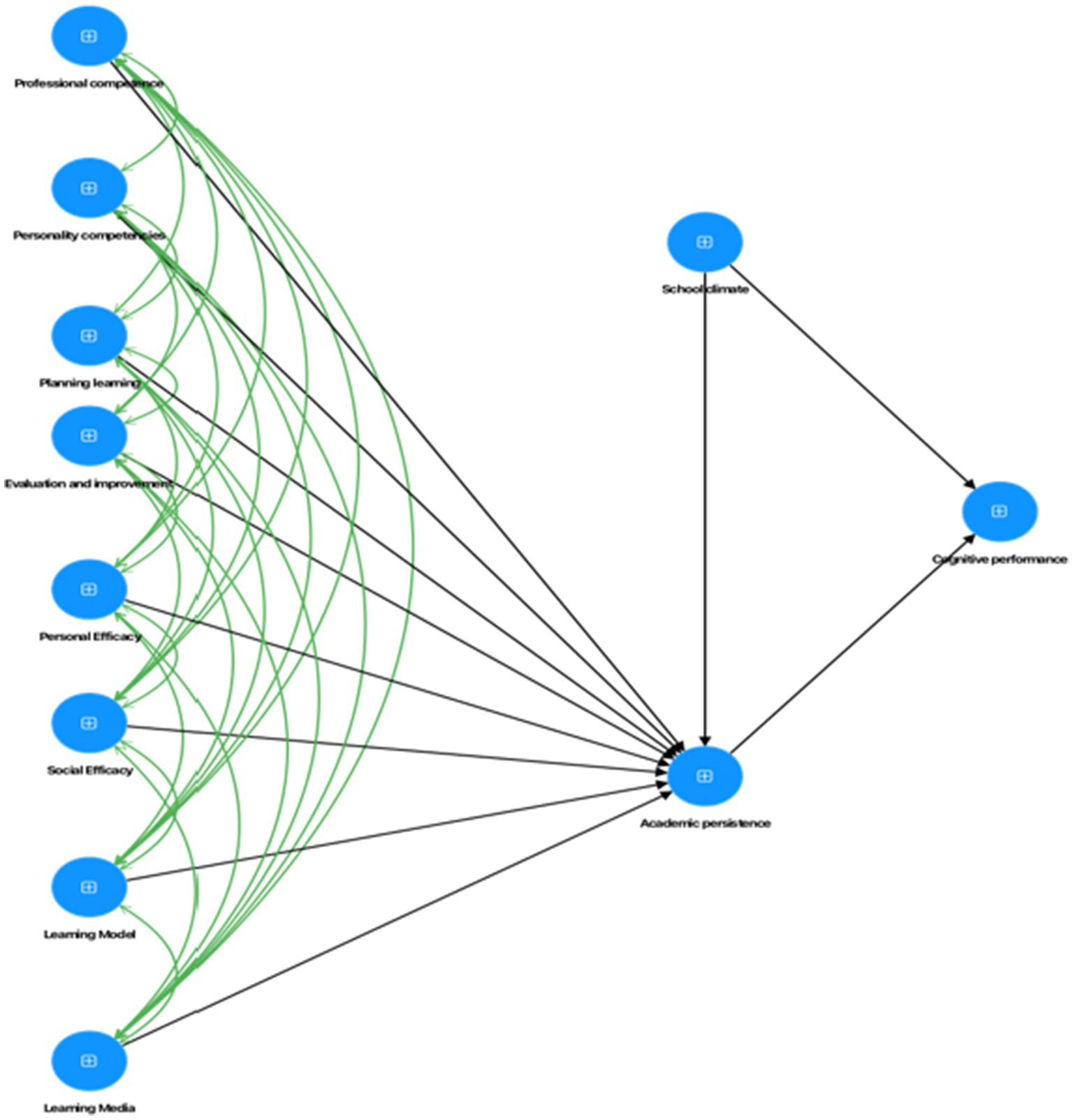
Figure 1. Model of the influence of the learning character dimension of teachers in the school climate on cognitive achievement.
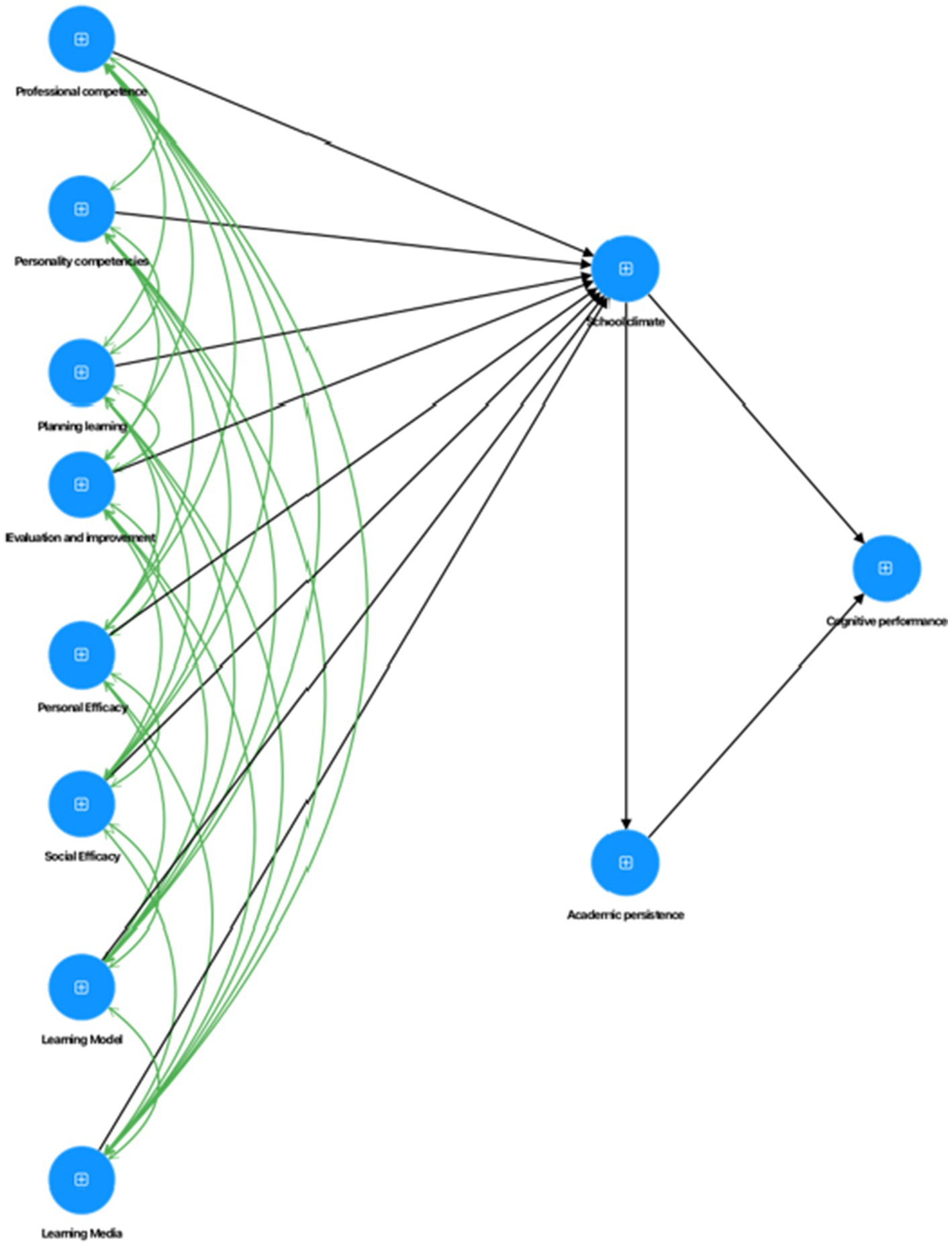
Figure 2. Model of the influence of the dimension of teacher learning character in the mediation, academic persistence on cognitive achievement.
Research method
Research design
The design of this study uses a quantitative approach with the analytical method of covariant base structural equation modeling (CB-SEM) to test the dimension of teachers’ learning character on cognitive achievement mediated by school climate variables and academic persistence. This approach was chosen because of the objective and systematic measurement of the variables studied.
Population and sample/material
The research sample was collected from 6 districts/cities in North Maluku Province, Indonesia, and the total research sample was 1,057 high school students. The distribution of the research sample is as follows: as many as 534 students from Ternate city, 132 students from South Halmahera district, 126 students from Morotai Island district, 116 students from Halmahera Utasa district, 96 students from Tidore Islands city and 53 students from West Halmahera district. The distribution of samples based on data distribution is seen in the following map image. Stratified random sampling was applied to ensure proportional representation of students across six districts (Figure 3).
Instrument/procedure
The arrangement of the instrument was carried out in three stages. The first instrument was prepared based on theoretical studies through the approach of adaptation, modification, and extraction of scientific sources for the preparation of the framework of variables and dimensions as well as the arrangement of statement items and questions for cognitive achievement variables (Bichi et al., 2019; Stransky et al., 2023). Second stage is validated by experts, at this point through five experts to validate the content of the instrument, which is then analyzed using the Aiken approach (Correro-Bermejo et al., 2024; Martinez-Rincon et al., 2022; Pedraz-Petrozzi et al., 2021). The third stage is an empirical test, which is carried out to test whether the instrument is suitable for use (Kumlien et al., 2017; Larasati et al., 2020; Parmaningsih and Saputro, 2021). By involving 157 high school students who were different from the sample to be studied, after conducting a validity and reliability test using SPSS 24 and the results of the instrument used for the research stage. The questionnaire used to collect the research data uses Google Forms, and the questionnaire book is distributed. The scale used in assessing the questionnaire items is a Likert scale with an interval from 1 (disagree) to 4 (strongly agree).
The instrument underwent a linguistic adaptation process, including translation and back-translation to ensure cultural appropriateness. A pilot study was also conducted on a separate sample of 157 students to assess clarity and reliability prior to full deployment (Table 1).
Analysis data
The data obtained will be analyzed statistically to identify the relationship between the character dimension of school management and cognitive achievement influenced by the mediation of school climate and academic persistence (Tables 2, 3). The data were analyzed univariate and bivariate using SPSS 24, then reliabilities analysis and Confirmatory factor analysis (CFA) were carried out using the JASP 0.19 application, and at the model evaluation analysis stage, SMARTPLS 4 was used (Figure 4).
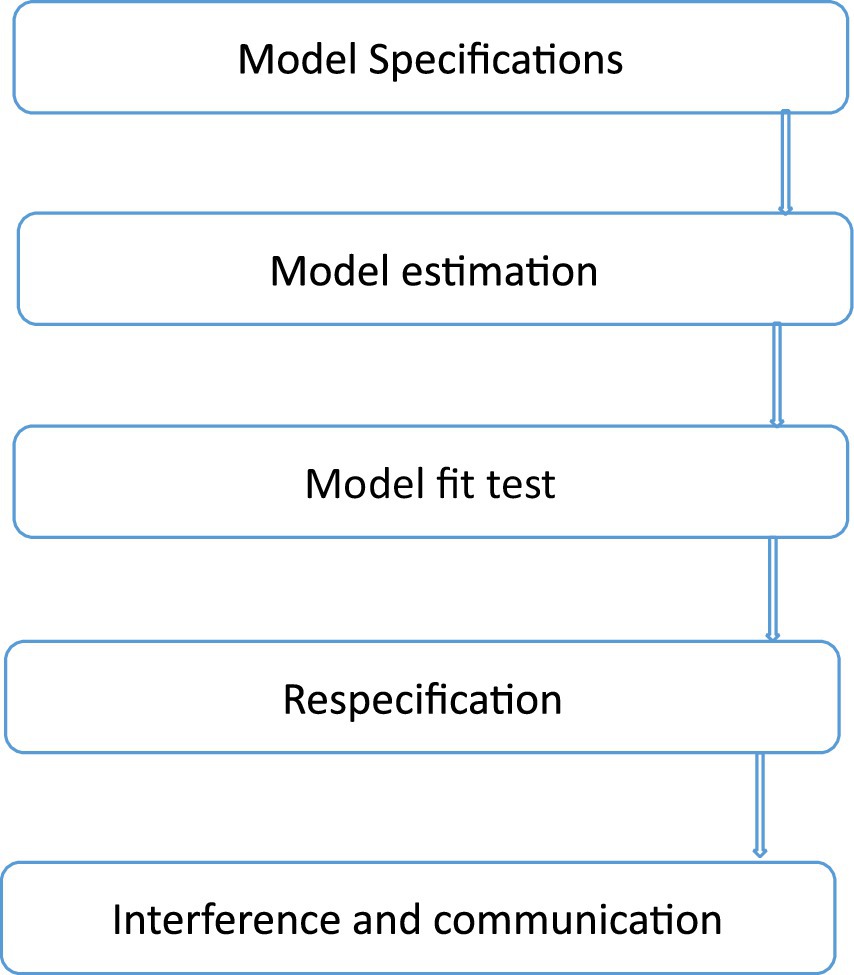
Figure 4. Stages of CB-SEM analysis (Legate et al., 2023).
Results
Although the Cronbach’s alpha value for the professional competence dimension was 0.673, which is slightly below the conventional threshold of 0.70, it remains acceptable for exploratory research (Shmueli et al., 2019). Moreover, all factor loadings within this dimension exceeded 0.6, and composite reliability values met the standard, supporting the internal consistency of the construct (Table 4).
Regarding the AVE values, while a few dimensions such as professional competence and learning model fell just below the 0.50 threshold, this was offset by strong convergent validity through item loadings and satisfactory HTMT values (Tables 5–7). According to Afthanorhan et al. (2021), AVE values slightly below 0.5 can still be acceptable when supported by other reliability metrics (Figure 5).
Discussion
This study analyzes the model of teacher learning character (personal competence, professional competence, learning design, evaluation of learning improvement, personal efficacy, social efficacy, learning model, learning media) on cognitive achievement influenced by school climate mediation and academic persistence. Teacher learning characteristics such as efficacy, competence, learning design, and learning evaluation positively affect cognitive achievement (Archambault et al., 2012; Bhai and Horoi, 2019; Flint et al., 2024; You et al., 2021). The relationship between social efficacy and personal efficacy from teachers also impacts improving student learning outcomes (Fan and Williams, 2018). In addition to direct relationships, the mediating influence of a positive school climate can also enhance the relationship between teachers and students, which supports a collaborative environment that will impact student achievement (Dickhäuser et al., 2021). The mediating role of students’ academic persistence, such as commitment and challenges, is a factor that supports the teacher’s learning character in improving student learning achievement (Kikas and Mägi, 2017). This study answers the variable gap that various dimensions of teacher learning character can directly affect teacher achievement and by mediating school climate and academic persistence.
Evaluation of the measurement of the teacher’s learning character model on cognitive achievement influenced by the mediation of school climate and academic persistence by confirming the compatibility of the model where the Goodness of fit (GoF) value indicates that this research model has a match with empirical data (Pho, 2024). The majority of indicators show that the model has met the criteria recommended for analysis in SEM. The main indicators of model compatibility are ChiSqr/df = 3.817, RMSEA = 0.053, GFI = 0.991, PGFI = 0.705, SRMR = 0.040, NFI = 0.901, TLI = 0.910, CFI = 0.924 indicating a fit value or meeting the required GoF value standard (Maia and Lima, 2021). Meanwhile, one indoctrination does not meet the value standard, namely AGFI = 0.862. Although the AGFI value is slightly below the ideal threshold ≥ 0.90, the overall model is still considered acceptable based on a combination of other strong indicators such as RMSEA, CFI, TLI, and SRMR. The slightly low AGFI value can be due to the complexity of the model that includes many constructs and mediation pathways, which can statistically affect the adjustment score. Some previous studies have also shown that AGFIs tend to be sensitive to sample size and the number of indicators in the model (Hair et al., 2019). Taking into account all the other GoF parameters that are in the good category, the validity of the model can still be maintained empirically and theoretically. Overall, this model meets the prerequisite GoF standards (Cho et al., 2020). This is in line with research conducted by Dević (2019). In its findings, it was stated that SEM’s analysis confirmed that teachers’ learning proficiency and learning characteristics significantly improved cognitive achievement and supported model conformity. The model hypothesized in various studies with data shows that the relationship between teacher behavior, school climate, and student learning outcomes is strong (Dević, 2019; Fan and Williams, 2018).
The study results show that the variables in this model have a significant direct influence on cognitive achievement and weak or insignificant relationships. Overall, the study’s results confirm that academic persistence, professional competence, social efficacy, and learning models significantly improve cognitive achievement. Teacher efficacy academically is a significant predictor of perseverance that can motivate students to improve their ability to seek good learning achievement (Lent et al., 2016). Collectively, it is confirmed that the variability of the dimension of teacher learning character has a negative impact on cognitive achievement, as found in Table 8 of the findings of direct influence. These factors are variable, reinforcing cognitive achievement (Andres, 2020).
The study’s findings on school climate mediation show a high significance level. These findings confirm that a good school climate can shape the variables of teachers’ learning characteristics toward the achievement of teachers. The learning model teachers apply can impact cognitive achievement due to the influence of school climate (Sari and Kismiantini, 2023). According to Maxwell et al. (2017), the school climate plays a significant role in the achievement of students’ academic outcomes. A positive student discipline and behavior climate can improve students’ cognitive achievement (Teng, 2020). In addition, the physical condition and social conditions of the school are the effect of instructional leadership on student achievement (Dutta and Sahney, 2022) (Table 9). This study also found that personal competence and personal efficacy with the mediation of school climate significantly affect cognitive achievement. School climate mediates the relationship between teacher competence and efficacy on students’ cognitive performance (Fan and Williams, 2018; Velásquez and Castellanos, 2024; Zysberg and Schwabsky, 2021). Positive perception of the school climate increases self-efficacy, leading to an increase in contemplative achievement (Fan and Williams, 2018; Zysberg and Schwabsky, 2021). The school climate strongly influences the positive relationship between teacher competence, teacher efficacy, and contingency achievement, as shown in Table 10 of the findings of school climate mediation. These findings show that creating a school climate, both physical and social conditions, is important because it can encourage the improvement of teachers’ learning character, which can ultimately improve students’ cognitive achievement.
This study fills the gap by revealing that school climate is important in mediating the relationship between teacher learning character and student achievement. Confirm that the variety of social efficacy, personality competence, and learning media significantly impact students’ cognitive achievement through the school climate. In addition, it highlights that not all aspects of Education contribute significantly to cognitive achievement, especially in the school climate mediation pathway. This gives a new perspective that the challenges of poor learning planning can have a negative impact on the academic environment and cognitive achievement (Table 11).
The study’s results showed that the confirmation of the factor of academic persistence as a mediator had a significant effect on learning media and cognitive achievement. This unexpected negative mediation effect may be attributed to cognitive overload caused by overuse or misapplication of learning media. Similar findings have been reported in prior studies, such as Law and Stock (2019), indicating that excessive media multitasking may negatively impact students’ focus and persistence. This can happen because there is a reciprocal relationship between student learning perseverance and teacher learning innovation, especially in making learning media (Wu et al., 2024). This strengthens the negative relationship trend, showing other influencing factors besides the learning media variable. Other findings show that personal efficacy mediated by academic persistence significantly affects cognitive achievement. Increased confidence in learning to students is influenced by student commitment and challenges as part of academic persistence to improve student academic achievement (Boudrenghien and Frenay, 2011; You, 2018). The mediation of significant academic persistence on cognitive achievement influences the learning model, but the relationship path is negative. This shows that specific learning models can improve students’ academic persistence, which ultimately leads to students’ Cognitive achievements. A complex and multifaceted relationship provides an adverse effect pathway between academic persistence and cognitive achievement (Law and Stock, 2019; Parry and Le Roux, 2018). However, persistence is generally beneficial and effective in improving cognitive achievement, but it depends on various factors, including the learning model, self-progress, stress management, and a conducive learning environment.
This study makes a new contribution that academic literature highlights the role of academic persistence as a mediator in the relationship between learning factors carried out by teachers or the character of teacher learning and students’ cognitive achievement. These findings show that learning media does not always positively impact cognitive achievement, especially if its use is ineffective and decreases students’ academic persistence. Teachers’ efficacy has a significant role or influence on academic persistence and student achievement. Meanwhile, a model of non-exhaustion can reduce students’ academic persistence and does not impact improving students’ cognitive achievement. These findings confirm that the school environment, such as school climate and academic persistence, play a significant role in determining the accomplishment of Shiva’s cognitive achievement if done well and positively. This study emphasizes that the importance of internal factors of teachers and students, as well as the formation of a climate, greatly determines students’ academic success. Increasing the competence of education providers, including teachers and school stakeholders, is a strategic factor that can affect student achievement.
Conclusion
This study confirms that the learning characteristics of teachers, school climate, and academic persistence are essential in improving cognitive prestige. These findings have significant implications for educators and policymakers and the importance of education in developing effective learning strategies. In particular, this study confirms that professional competence, problem-solving, learning design, and learning models applied by teachers directly and indirectly influence cognitive achievement. Therefore, it is important for teachers to continue to develop capacity through continuous professional training, especially in learning methods, classroom management, and student-centered learning approaches. Schools must also create a school climate that focuses on learning culture because it can encourage innovation and collaboration between teachers to increase the effectiveness of the learning process.
The role of school climate mediation as a mediator in improving student achievement. A conducive academic environment can strengthen the impact of the learning model applied by teachers. Schools need to ensure that the policies and learning practices implemented can create an atmosphere that supports academic engagement and students’ success. Strategic steps need to be taken to promote school leadership, improve supporting facilities, and manage positive social relations in the school environment.
The findings of this study also reveal that academic persistence is a key factor in bridging teachers’ personal efficacy and cognitive achievement. The higher the students’ academic persistence, the more excellent the opportunity for students to achieve optimal learning skills. Therefore, schools and education institutions must integrate learning strategies to increase students’ intrinsic motivation, such as challenge-based learning, self-reflection, and constructive feedback. In addition, the use of learning media must be in accordance with the needs of students because, in learning science, content must be adjusted to the learning media.
Overall, this study provides in-depth insights into the interaction between teachers, the school environment, and students in shaping academic success. The implications of these findings underscore the importance of a multidimensional approach in education that does not only focus on strengthening motivation and resilience. By applying the results of this research to education policies and practices, it is hoped that a learning system that is more adaptive, inclusive, and oriented toward developing student potential can be maximized.
Data availability statement
The raw data supporting the conclusions of this article will be made available by the authors, without undue reservation.
Ethics statement
Ethical review and approval was not required for the study on human participants in accordance with the local legislation and institutional requirements. Written informed consent from the participants was not required to participate in this study in accordance with the national legislation and the institutional requirements.
Author contributions
SA: Conceptualization, Data curation, Formal analysis, Funding acquisition, Investigation, Methodology, Project administration, Resources, Software, Supervision, Validation, Visualization, Writing – original draft, Writing – review & editing. HS: Supervision, Conceptualization, Validation, Writing – review & editing. ER: Supervision, Conceptualization, Validation, Writing – review & editing.
Funding
The author(s) declare that no financial support was received for the research and/or publication of this article.
Acknowledgments
We would like to thank the North Maluku Provincial Education Office for giving us permission to conduct research.
Conflict of interest
The authors declare that the research was conducted in the absence of any commercial or financial relationships that could be construed as a potential conflict of interest.
Generative AI statement
The authors declare that no Gen AI was used in the creation of this manuscript.
Any alternative text (alt text) provided alongside figures in this article has been generated by Frontiers with the support of artificial intelligence and reasonable efforts have been made to ensure accuracy, including review by the authors wherever possible. If you identify any issues, please contact us.
Publisher’s note
All claims expressed in this article are solely those of the authors and do not necessarily represent those of their affiliated organizations, or those of the publisher, the editors and the reviewers. Any product that may be evaluated in this article, or claim that may be made by its manufacturer, is not guaranteed or endorsed by the publisher.
References
Abuelmaatti, A., and Vinokur, L.. (2024). Future horizons in learning environment: transcending boundaries for empowered graduates through multi-disciplinary education. In: 2024 IEEE Global Engineering Education Conference (EDUCON), 1–6.
Afthanorhan, A., Ghazali, P. L., and Rashid, N. (2021). Discriminant validity: a comparison of CBSEM and consistent PLS using Fornell & Larcker and HTMT approaches. J. Phys. Conf. Ser. 1874:2085. doi: 10.1088/1742-6596/1874/1/012085
Al Jaberi, A. T., Alzouebi, K., and Abu Khurma, O. (2024). An investigation into the impact of teachers’ emotional intelligence on students’ satisfaction of their academic achievement. Soc. Sci. 13:244. doi: 10.3390/socsci13050244
Amsalu, A., and Belay, S. (2024). Analyzing the contribution of school climate to academic achievement using structural equation modeling. SAGE Open 14:271. doi: 10.1177/21582440241227271
Andres, H. (2020). The role of active teaching, academic self-efficacy, and learning behaviors in student performance. J. Int. Educ. Bus. 13, 221–238. doi: 10.1108/JIEB-02-2020-0017
Andriyani, D., and Suhartono, D. (2019). Learning improvement efforts through reflective studies in elementary schools. Univer. J. Educ. Res. 7, 2734–2741. doi: 10.13189/ujer.2019.071222
Archambault, I., Janosz, M., and Chouinard, R. (2012). Teacher beliefs as predictors of adolescents’ cognitive engagement and achievement in mathematics. J. Educ. Res. 105, 319–328. doi: 10.1080/00220671.2011.629694
Archambault, I., Pascal, S., Tardif-Grenier, K., Dupéré, V., Janosz, M., Parent, S., et al. (2020). The contribution of teacher structure, involvement, and autonomy support on student engagement in low-income elementary schools. Teach. Teach. 26, 428–445. doi: 10.1080/13540602.2020.1863208
Audisio, A. P., Taylor-Perryman, R., Tasker, T. B., and Steinberg, M. P. (2024). Does teacher professional development improve student learning? Evidence from leading educators’ fellowship model. J. Res. Educ. Eff. 1, 1–40. doi: 10.1080/19345747.2024.2361467
Bhai, M., and Horoi, I. (2019). Teacher characteristics and academic achievement. Appl. Econ. 51, 4781–4799. doi: 10.1080/00036846.2019.1597963
Bichi, A. A., Talib, R., Embong, R., Supie, H. S. M., and Khairuddin, M. N. (2019). Development and validation of behavioural and health sciences research instrument. Indian J. Public Health Res. Dev. 10:1437. doi: 10.5958/0976-5506.2019.01501.8
Binks-Cantrell, E., and Joshi, R. M. (2015). “Connecting research and practice through teacher knowledge” in Li, Y., and Hammer, J. (Eds.). Teaching at work (Rotterdam: SensePublishers), 29–48. doi: 10.1007/978-94-6300-082-6_3
Boudrenghien, G., and Frenay, M. (2011). La transition de l’enseignement secondaire vers l’enseignement supérieur: Rôle des représentations et motivations à l’égard de son projet de formation. L’Orientation Scolaire et Professionnelle 40:3073. doi: 10.4000/osp.3073
Chen, L., and Wang, H. (2024). Analyzing the factors affecting Chinese higher vocational college students’ learning engagement: the roles of perceived teacher support and achievement goal. Pak J Life Soc Sci 22:330. doi: 10.57239/PJLSS-2024-22.2.00330
Cho, G., Hwang, H., Sarstedt, M., and Ringle, C. M. (2020). Cutoff criteria for overall model fit indexes in generalized structured component analysis. J. Mark. Anal. 8, 189–202. doi: 10.1057/s41270-020-00089-1
Choi, Y., and Lee, H. (2022). Psychometric properties for multidimensional cognitive load scale in an E-learning environment. Int. J. Environ. Res. Public Health 19:5822. doi: 10.3390/ijerph19105822
Correro-Bermejo, A., Bas-Sarmiento, P., Romero-Sánchez, J. M., Paloma-Castro, O., Poza-Méndez, M., and Fernández-Gutiérrez, M. (2024). Role of the health literacy assessment in healthcare: content validation of “health literacy behaviour” nursing outcome. Int. J. Nurs. Knowl. 36, 264–274. doi: 10.1111/2047-3095.12482
Danişman, Ş., Güler, M., and Karadağ, E. (2020). The effect of teacher characteristics on student achievement: a Meta-analysis study / Utjecaj učiteljskih osobina na učenička postignuća: Meta-analitička studija. Croat. J. Educ. 21:322. doi: 10.15516/cje.v21i4.3322
Del Gobbo, G., and Galeotti, G. (2022). Learning analytics to Foster quality culture in education and training organizations. In: Social Justice, Media and Technology in Teacher Education. (103–115).
Dević, I. (2019). Student school achievement: testing a model of academic competence. Drustv. Istraz. 28, 523–542. doi: 10.5559/di.28.3.08
Dickhäuser, O., Janke, S., Daumiller, M., and Dresel, M. (2021). Motivational school climate and teachers’ achievement goal orientations: a hierarchical approach. Br. J. Educ. Psychol. 91, 391–408. doi: 10.1111/bjep.12370
Dutta, V., and Sahney, S. (2022). Relation of principal instructional leadership, school climate, teacher job performance and student achievement. J. Educ. Adm. 60, 148–166. doi: 10.1108/JEA-01-2021-0010
Fan, W., and Williams, C. (2018). The mediating role of student motivation in the linking of perceived school climate and achievement in reading and mathematics. Front. Educ. 3:50. doi: 10.3389/feduc.2018.00050
Flint, A., Rubie-Davies, C. M., and Peterson, E. (2024). Teacher views of relationships between their teaching practices and beliefs, the school context, and student achievement. N. Z. J. Educ. Stud. 59, 157–173. doi: 10.1007/s40841-024-00321-x
Gaganao, R. D., and Odon, M. G. B. (2024). Teaching proficiency of pre-service secondary teachers in Eastern Samar state university-Salcedo campus. J Educ Learn 18, 848–857. doi: 10.11591/edulearn.v18i3.21070
Groskurth, K., Bluemke, M., and Lechner, C. M. (2024). Why we need to abandon fixed cutoffs for goodness-of-fit indices: an extensive simulation and possible solutions. Behav. Res. Methods 56, 3891–3914. doi: 10.3758/s13428023-02193-3
Hair, J. F., Risher, J. J., Sarstedt, M., and Ringle, C. M. (2019). When to use and how to report the results of PLS-SEM. Eur. Bus. Rev. 31, 2–24. doi: 10.1108/EBR-11-2018-0203
Hammar Chiriac, E., Forsberg, C., and Thornberg, R. (2023). Teachers’ perspectives on factors influencing the school climate: a constructivist grounded theory case study. Cogent Educ. 10:171. doi: 10.1080/2331186X.2023.2245171
Kikas, E., and Mägi, K. (2017). Does self-efficacy mediate the effect of primary school teachers’ emotional support on learning behavior and academic skills? J. Early Adolesc. 37, 696–730. doi: 10.1177/0272431615624567
Kocsis, Z., and Pusztai, G. (2025). The role of higher education through the eyes of Hungarian undergraduate students and graduates: a qualitative exploratory study. Int. J. Res. Vocat. Educ. Train. 12, 48–75. doi: 10.13152/IJRVET.12.1.3
Kumlien, C., Nordanstig, J., Lundström, M., and Pettersson, M. (2017). Validity and test retest reliability of the vascular quality of life Questionnaire-6: a short form of a disease-specific health-related quality of life instrument for patients with peripheral arterial disease. Health Qual. Life Outcomes 15:187. doi: 10.1186/s12955-017-0762-1
Larasati, P. E., Supahar, H., and Yunanta, D. R. A. (2020). Validity and reliability estimation of assessment ability instrument for data literacy on high school physics material. J. Phys. Conf. Ser. 1440:012020. doi: 10.1088/1742-6596/1440/1/012020
Law, A. S., and Stock, R. (2019). Learning approach and its relationship to type of media use and frequency of media-multitasking. Act. Learn. High. Educ. 20, 127–138. doi: 10.1177/1469787417735612
Legate, A. E., Hair, J. F., Chretien, J. L., and Risher, J. J. (2023). <scp>PLS-SEM</scp> : prediction-oriented solutions for <scp>HRD</scp> researchers. Hum. Resour. Dev. Q. 34, 91–109. doi: 10.1002/hrdq.21466
Lent, R. W., Miller, M. J., Smith, P. E., Watford, B. A., Lim, R. H., and Hui, K. (2016). Social cognitive predictors of academic persistence and performance in engineering: applicability across gender and race/ethnicity. J. Vocat. Behav. 94, 79–88. doi: 10.1016/j.jvb.2016.02.012
Liu, Q., Du, X., and Lu, H. (2023). Teacher support and learning engagement of EFL learners: the mediating role of self-efficacy and achievement goal orientation. Curr. Psychol. 42, 2619–2635. doi: 10.1007/s12144-022-040435
Ma, J., Cheng, J., and Han, X. (2017). Initial development process of a student engagement scale in blended learning environment. In: 2017 international conference of educational innovation through technology (EITT), 234–237.
Maia, J. L., and Lima, M. A. M. (2021). Modelagem de Equações Estruturais e os testes de seleção – Caso do vestibular da Universidade Estadual do Ceará. Ensaio: Avaliação e Políticas Públicas Em Educação 29, 804–827. doi: 10.1590/s0104-403620210002902107
Martinez-Rincon, J. A., Rueda-Mahecha, Y. M., Silva-Giraldo, C. A., and Martínez García, C. A. (2022). Diseño y validación de un Instrumento para analizar el quehacer del profesional o especialista en seguridad y salud en el trabajo. Techno Rev 12, 1–13. doi: 10.37467/revtechno.v11.4403
Maxwell, S., Reynolds, K. J., Lee, E., Subasic, E., and Bromhead, D. (2017). The impact of school climate and school identification on academic achievement: multilevel modeling with student and teacher data. Front. Psychol. 8:69. doi: 10.3389/fpsyg.2017.02069
Ni, Z., and Wang, F. (2022). Quality assessment of vocational education teaching reform based on deep learning. Comput. Math. Methods Med. 2022, 1–11. doi: 10.1155/2022/1499420
Parmaningsih, T. J., and Saputro, D. R. S. (2021). Rasch analysis on item response theory: review of model suitability. AIP Conf. Proc. 2326:020017. doi: 10.1063/5.0040305
Parry, D. A., and Le Roux, D. B. (2018). In-lecture media use and academic performance: investigating demographic and intentional moderators. South Afr Comput J 30:434. doi: 10.18489/sacj.v30i1.434
Pedraz-Petrozzi, B., Arévalo-Flores, M., Krüger-Malpartida, H., and Anculle-Arauco, V. (2021). Validación por expertos del Índice de Distrés Peri-traumático relacionado con la Enfermedad por Coronavirus 2019 para su uso en el Perú. Rev. Neuropsiquiatr. 83, 228–235. doi: 10.20453/rnp.v83i4.3888
Pho, K.-H. (2024). Goodness of fit test for a zero-inflated Bernoulli regression model. Commun Stat Simul Comput 53, 756–771. doi: 10.1080/03610918.2022.2032158
Purković, D., and Kovačević, S. (2020). Teachers’ perception of the influence of the teaching context on cognitive achievements in general technology education. Int. J. Cogn. Res. Sci. Eng. Educ. 8, 1–15. doi: 10.23947/2334‑8496‑2020‑8‑SI‑1‑15
Santaolalla, E., Urosa, B., Martín, O., Verde, A., and Díaz, T. (2020). Interdisciplinarity in teacher education: evaluation of the effectiveness of an educational innovation project. Sustainability 12:6748. doi: 10.3390/su12176748
Sari, I. N., and Kismiantini, H. (2023). The school climate in mathematics achievement: findings from PISA 2018 Indonesia. AIP Conf Proc 2556:050010. doi: 10.1063/5.0110260
Sarkar, P. S. (2023). “Transforming higher education into asynchronous learning: challenges and opportunities from the gender perspective in India” in Chakraborty, T., Natarajan, A., Mishra, N., and Ganguly, M. (Eds.). Digitalization of higher Education (New York, NY: Apple Academic Press). 287301. doi: 10.1201/9781003412151-16
Sebastian, J., Allensworth, E., and Huang, H. (2016). The role of teacher leadership in how principals influence classroom instruction and student learning. Am. J. Educ. 123, 69–108. doi: 10.1086/688169
Shmueli, G., Sarstedt, M., Hair, J. F., Cheah, J.-H., Ting, H., Vaithilingam, S., et al. (2019). Predictive model assessment in PLS-SEM: guidelines for using plspredict. Eur. J. Mark. 53, 2322–2347. doi: 10.1108/EJM-02-2019-0189
Spiel, C., Schwartzman, S., Busemeyer, M., Cloete, N., Drori, G., Lassnigg, L., et al. (2018). “The contribution of education to social Progress” in I. Wallerstein, R. Reinert, and D. H. Fukuyama (Eds.). Rethinking society for the 21st century. (Cambridge, UK: Cambridge University Press), 753–778.
Stransky, J., Bodnar, C., Bassett, L., Cooper, M., Anastasio, D., and Burkey, D. (2023). Engineering process safety research instrument: assessing students’ moral reasoning in process safety contexts. Educ. Chem. Eng. 42, 44–53. doi: 10.1016/j.ece.2022.11.004
Sunarya, L., Hidayat, F., Hidayanti, R., Khanza, A., Firli, M. Z., and Kamil, M. F. (2024). Assessing the impact of skills involvement, and development on graduate marketability. In: 2024 3rd International Conference on Creative Communication and Innovative Technology (ICCIT), 1–6.
Surjanovic, N., and Loughin, T. M. (2024). Improving the Hosmer-Lemeshow goodnessof-fit test in large models with replicated Bernoulli trials. J. Appl. Stat. 51, 1399–1411. doi: 10.1080/02664763.2023.2272223
Teng, Y. (2020). The relationship between school climate and students’ mathematics achievement gaps in Shanghai China: evidence from PISA 2012. Asia Pac. J. Educ. 40, 356–372. doi: 10.1080/02188791.2019.1682516
Velásquez, A. M., and Castellanos, M. (2024). Riesgo Familiar y Autocreencias Académicas: El Rol Moderador del Clima Escolar. REICE Rev. Iberoam. Sobre Calidad Efic. Cambio Educ. 22, 127–147. doi: 10.15366/reice2024.22.3.007
Wu, X., Liu, H., Xiao, L., and Yao, M. (2024). Reciprocal relationship between learning interest and learning persistence: roles of strategies for self-regulated learning behaviors and academic performance. J. Youth Adolesc. 53, 2080–2096. doi: 10.1007/s10964-024-01994-9
You, J. W. (2018). Testing the three-way interaction effect of academic stress, academic self-efficacy, and task value on persistence in learning among Korean college students. High. Educ. 76, 921–935. doi: 10.1007/s10734-0180255-0
You, S., Kim, E. K., Lim, S. A., and Dang, M. (2021). Student and teacher characteristics on student math achievement. J. Pac. Rim Psychol. 15:1428. doi: 10.1177/1834490921991428
Zickafoose, A., Ilesanmi, O., Diaz-Manrique, M., Adeyemi, A. E., Walumbe, B., Strong, R., et al. (2024). Barriers and challenges affecting quality education (sustainable development goal #4) in sub-Saharan Africa by 2030. Sustainability 16:2657. doi: 10.3390/su16072657
Keywords: teacher learning character, cognitive performance, school climate, academic persistence, CB-SEM model
Citation: Abukasim SM, Sutrisno H and Rohaeti E (2025) Unveiling the hidden mechanisms behind cognitive achievement: a structural equation modeling approach to teacher learning, academic persistence, and school climate. Front. Educ. 10:1590215. doi: 10.3389/feduc.2025.1590215
Edited by:
Syahril Syahril, Bandung State Polytechnic, IndonesiaReviewed by:
Enrique H. Riquelme, Temuco Catholic University, ChileAnuphum Kumyoung, Loei Rajabhat University, Thailand
Huajie Shen, Fujian University of Technology, China
Copyright © 2025 Abukasim, Sutrisno and Rohaeti. This is an open-access article distributed under the terms of the Creative Commons Attribution License (CC BY). The use, distribution or reproduction in other forums is permitted, provided the original author(s) and the copyright owner(s) are credited and that the original publication in this journal is cited, in accordance with accepted academic practice. No use, distribution or reproduction is permitted which does not comply with these terms.
*Correspondence: Sudarto M. Abukasim, c3VkYXJ0b2FidWthc2ltMjFAZ21haWwuY29t
 Sudarto M. Abukasim
Sudarto M. Abukasim Hari Sutrisno
Hari Sutrisno